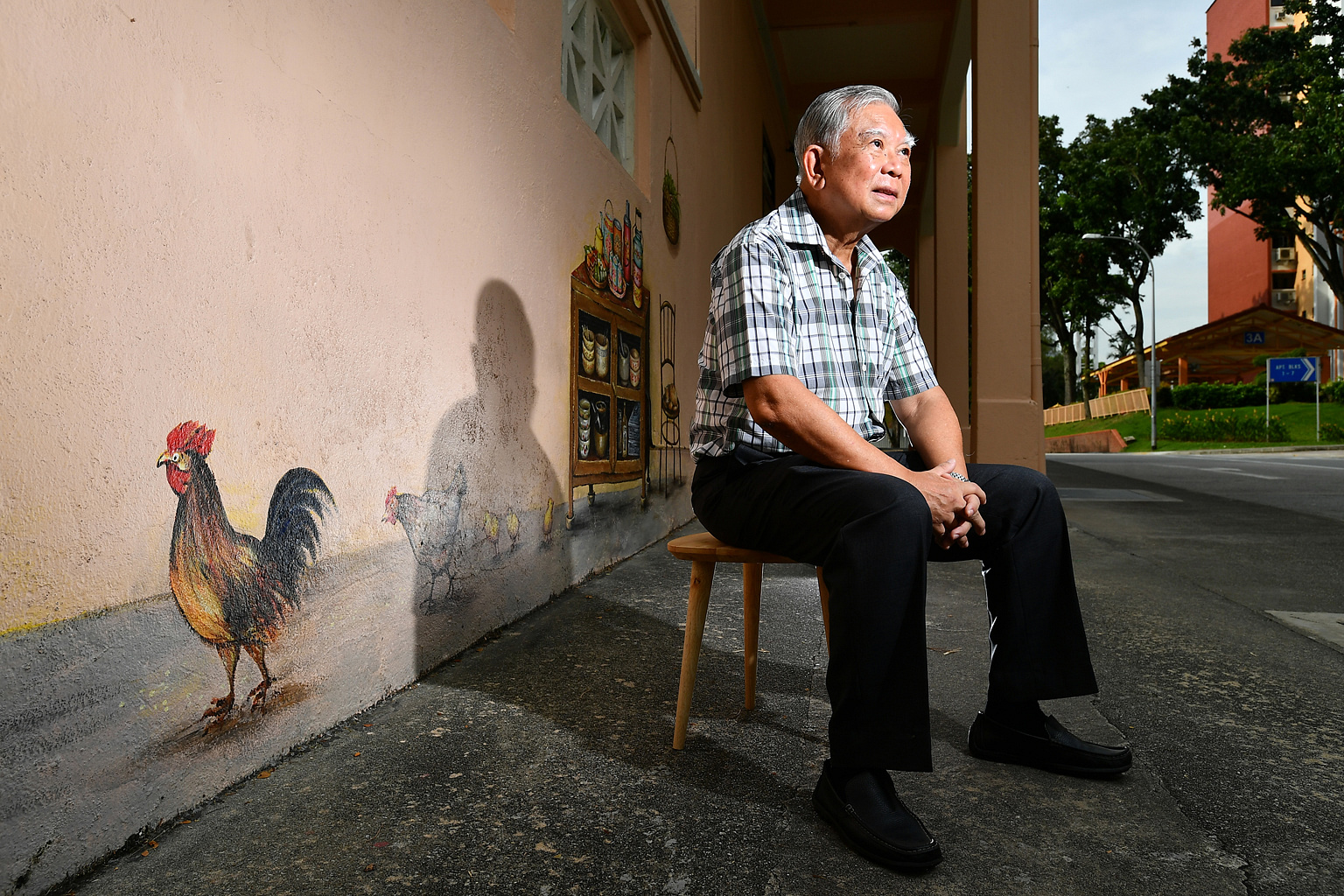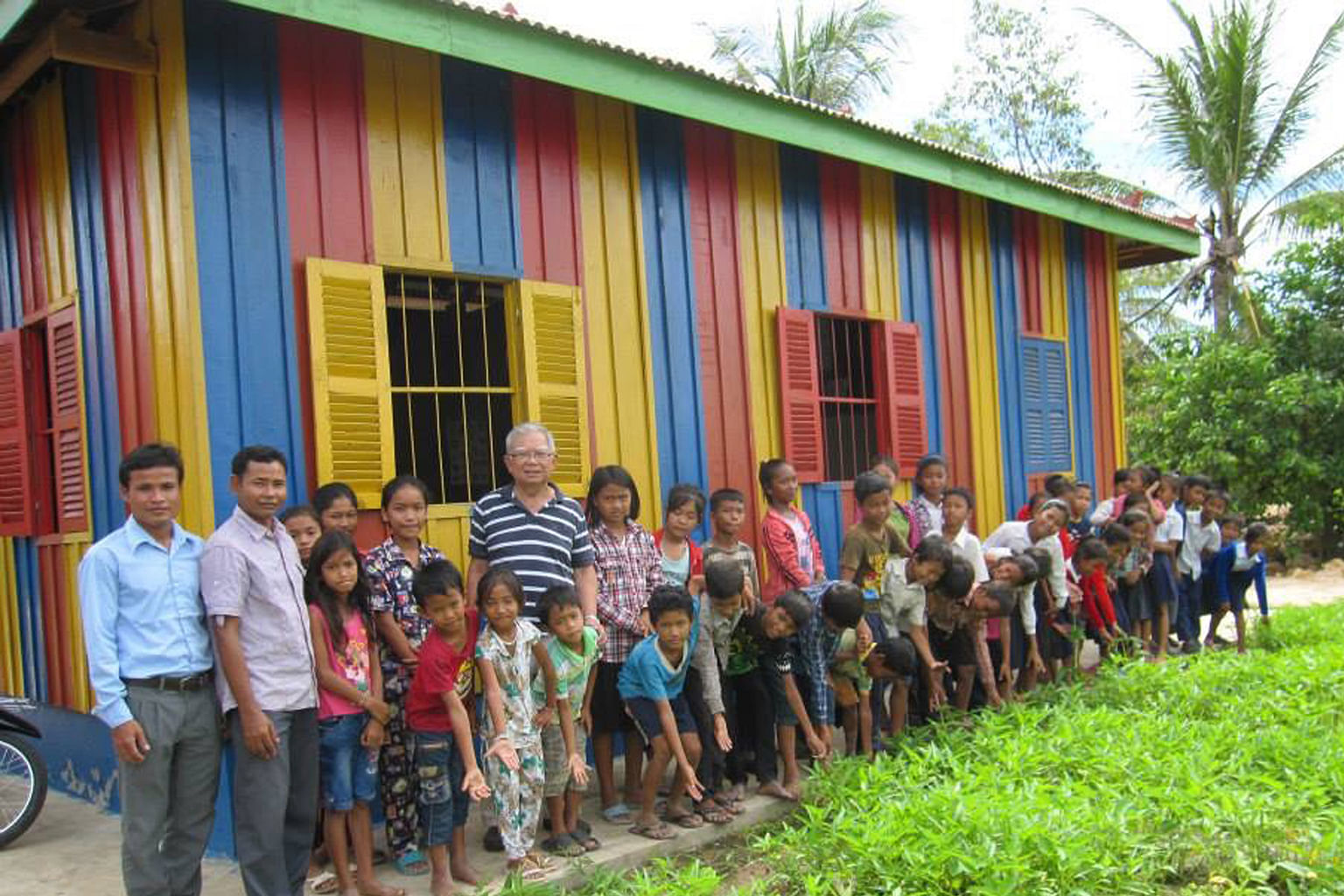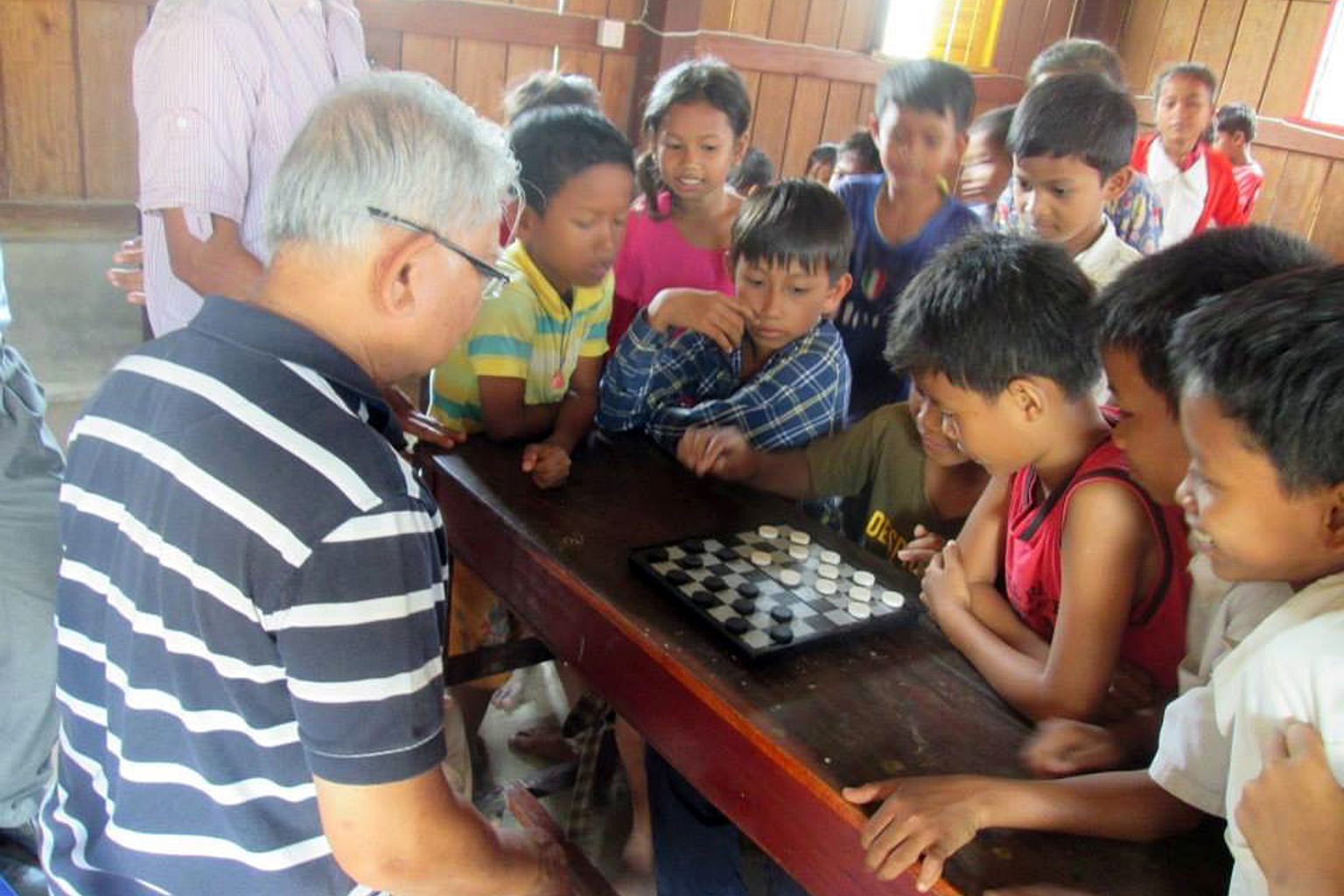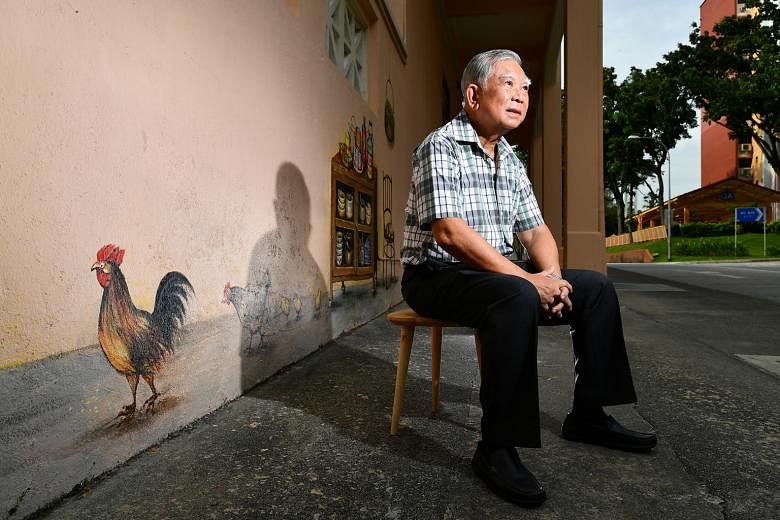Rather appropriately for the Year of the Rooster, Mr Tan Peng Ann has hatched a project for poor Cambodians to scratch out a living and feather their nests.
A chicken breeding programme called One Rooster Seven Hens, it took months of research and trials.
The one-seven combination, says the retired colonel turned social entrepreneur and charity worker, can give a villager between 80 and 90 eggs a month.
"And that, in turn, can result in 40 or 50 hatched chickens which, when sold, can bring in between US$150 (S$212) and US$200 a month," says the 68-year-old, adding that the start-up capital is about US$300.
Mr Tan, who has been helping poor communities in Cambodia for over 10 years, hopes to roll out the project by the middle of this year.

It is not the only enterprise he has up his sleeves. Mr Tan has spent the last three years refining a self-sustaining "Learning Capacity Development Programme", one which involves breeding pigs and chickens to finance, build and support learning centres and village schools in poor communities. The initiatives are undertaken by Sangkhoem Khmer (Cambodia Hope), a non-governmental organisation he started in 2014 to undertake charity projects which are "secular, sustainable, scalable and replicable".
Born a few years after World War II, Mr Tan is the third of four children of a trader and a housewife. He grew up in the colourful Tiong Bahru area, although his protective mother saw to it that he did not get involved with the neighbourhood's less savoury elements.
After completing his primary education at Tiong Bahru and Tanglin Primary, he earned himself a spot at Raffles Institution.
At 18, his father died.
"My mother insisted that I go to work. I was disappointed because I wanted to go to university and be an engineer," says Mr Tan who enrolled in the former Teachers' Training College, now the National Institute of Education, in 1967.
He cut his teeth teaching science at Whitley Secondary but his life took an unexpected detour when he was called up for national service three months later.
"I was born in 1948 and didn't belong to the group (those born between Jan 1 and June 30, 1949) who were in the first batch to be called up for NS. But a lot of people didn't know there was also a batch of those born earlier - those who were in the civil service or who had higher education - who were also called up," he says.
Not only was his teacher training disrupted, his life also changed because national service led him to sign up for a military career which spanned more than 30 years.
The rigours of army training appealed because it was, he says, different from his sheltered and conservative upbringing.
He acquitted himself well and after basic military training, was picked to attend Officer Cadet School where he was trained as a logistics officer and later deployed to the Ministry of Defence (Mindef) as a service officer.
For five years, he served under an Israeli officer who taught him the finer skills of strategic military manpower planning. It was a formative period, one which he says toughened him up and made him mature.
Mindef, at that time, came under the purview of the late Dr Goh Keng Swee, whom he describes as a forward-thinking and decisive leader.

He remembers one morning when he was asked to see the former deputy prime minister and finance minister: "He gave me a project and I started to take notes. He then looked at me and said, 'Listen, don't write. Listen to me'."
Since then, "the art of listening, of paying attention" has never left him. Then a fledgling, Mindef in those days, he says, was a heady place to work in. "We were given opportunities to do things we thought were appropriate. There was not much hierarchy and bureaucracy. Things needed to be done and we did them."
Mr Tan, who was then already a major in his mid-20s, adds: "I got promoted very fast. At just 25, I was responsible for the movements of people in the SAF.
"My key areas were macro manpower planning, deciding how many to train as what, where and how."
In 1972, he underwent training to convert from a service to infantry officer. More than a decade later, he went on to study political science and history at the National University of Singapore on an army study award. He also has a Master of Science in Training from the University of Leicester.
Altogether, Mr Tan - who married a former Mindef clerk when he was 28 - spent three decades in various positions in the army, including as commander of the Central Manpower Base. When he left in 1997, he was already a colonel.
He could have retired from the military and lived on a comfortable pension but was seized by the compulsion to take on challenges in a different environment.
"In the army, when I pressed the button, everyone ran. But I knew that when I left, I would be the one running if the button is pressed," he quips.
Having conducted leadership and management courses in the military, he became an associate trainer at the Civil Service College for a couple of years.
Life took another turn when a friend asked him to conduct a leadership training course for professionals in Cambodia in 2004. During the course, a participant, Mr Sil Sineng - a Cambodian refugee who worked for World Vision - approached him. "I was talking about vision and he came up to me and said: 'I have a vision to help the people in my former village. Would you help me?' "
After visiting Tramkul Village, located in one of Cambodia's poorest regions 50km south of Phnom Penh, Mr Tan agreed. Then the president of the Lion's Club in Singapore, he raised funds to start a village school which offered English lessons to the village kids.
Mr Sineng managed the project while Mr Tan financed it with contributions from friends and relatives in Singapore.
Not long after, another friend asked him to help out in the slum district in Wat Than. Together with ACE, an NGO, he started a programme called Porridge for Hope, and also a learning centre offering English lessons to get children off the streets.
In 2009, Mr Sineng died suddenly. With his death, the Tramkul project became poorly managed. The one at Wat Than was dogged by management issues which, Mr Tan noticed, affected initiatives by many NGOs too.
"I saw a lot of foreigners going in to do things, but they would pull out after a year or two. There was no continuity; poverty continued to be there. Even my own efforts were not sustainable; I still needed donations from people."
The state of affairs made him uncomfortable.

"I was not focused. I also found out that at the end of the day, the people we were trying to help did not have the right mindset; they expected to receive, but not to give. I felt this was untenable," he says, adding that he withdrew support for both projects in 2012.
To be effective, Mr Tan decided he needed to take control. Marshalling all his planning and organisational skills, he decided to launch Sangkhoem Khmer, an NGO registered with the Ministry of the Interior in Cambodia.
There is a clear management structure, with teams in both Singapore and Cambodia. The emphasis, he says, is "less of giving, more of encouragement to do self-help", with stakeholders being not just himself but also the management team, donors, staff and community.
Sangkhoem Khmer's first project is in Angkunh Village, in the Khvao Commune which has 18 villages. Mr Tan shelled out US$6,000 for a 1,800 sq m piece of land, enough not just to build a learning centre but also to engage in husbandry to fund and support it. To help him run the project, he hired Mr Mien Heng, 30, who had worked with him in Wat Than.
Through research, Mr Tan believes that breeding pigs and chickens is the quickest way to generate an income. Together with Mr Heng, he spent more than two years and $30,000 honing his pig and chicken breeding skills.
"The first year was bad, a complete learning experience."
But Mr Tan, who read extensively on the subject, reckons he now has more than a good handle on rearing and breeding techniques. In fact, he has come up with his own feeding mix for his pigs, one which is cheaper than commercial mixes but boasts more vitamins and minerals.
"I have 15 sows now; they can give me 150 piglets every six months. One year, I can get 300 pigs, with each one fetching between US$65 and US$130," says Mr Tan, who also produces between 150 and 200 chickens for sale each month.
The money goes towards funding the learning centre where about 100 students pay 1,000 Cambodian riels (35 Singapore cents) every month, to go through a structured English programme. Besides language lessons, the students also learn concepts like respect, cleanliness and discipline.
Looking chuffed, Mr Tan says the Angkunh project is starting to reap returns.
"By the middle of this year, we should generate enough income to pay staff salaries and run the school," he says, adding that he has four people on his payroll.
It helps, he says, to have Mr Heng who is vet, project manager and personal assistant all rolled into one.
"When he first came to me, he didn't even know how to write a cheque. Today, he delivers the pigs, feeds the chickens and reports to me every night," he says.
The duo are now documenting the programme, which Mr Tan hopes to take to other villages and provinces via other NGOs.
"Any organisation just needs to have an outlay of US$60,000 to have a self-contained project like this running in six months. It can be replicated anywhere," says Mr Tan, who hopes to share his vision and methods at a seminar for universities and NGOs in Phnom Penh in a couple of months.
Sprightly and alert, Mr Tan - whose son, 40, is a doctor and daughter, 38, a psychologist - laughs when asked why he is working so hard at his age.
Sitting idle is not his idea of retirement, he says.
A health scare in 2012, when he was hospitalised for internal bleeding, prompted him not to put off doing what he finds fulfilling.
He wrote and published a photo-filled coffee-table book, Story Of My Life, for his loved ones. Now working on a book on how to retire gracefully, he is also penning a volume of short stories about his life and experiences for his seven grandchildren, aged between three months and 10 years.
In the general election two years ago, the former People's Action Party grassroots leader at Fengshan contested as a member of the SingFirst opposition party in Jurong GRC.
He had strong feelings on certain government policies, such as the over-emphasis on economic growth and success.
SingFirst got only 20.71 per cent of the votes against the PAP team led by Deputy Prime Minister Tharman Shanmugaratnam.
Mr Tan says he did not contest to win but to make sure that a dissenting voice could be heard.
"My involvement in the opposition wasn't necessarily positive but I wanted to raise the point that people must do something if they feel something is not right. You must dirty your hands and put your money where your mouth is."
Asked if he is done with politics, he grins and says: "I'm not so sure. I'll decide as I go along."
Meanwhile, he is beavering away to make sure his programme can help as many poor communities as possible.
He says: "My feeling is many people need help. In the last few years of my life, I must do something. It's not right if I don't do anything."


